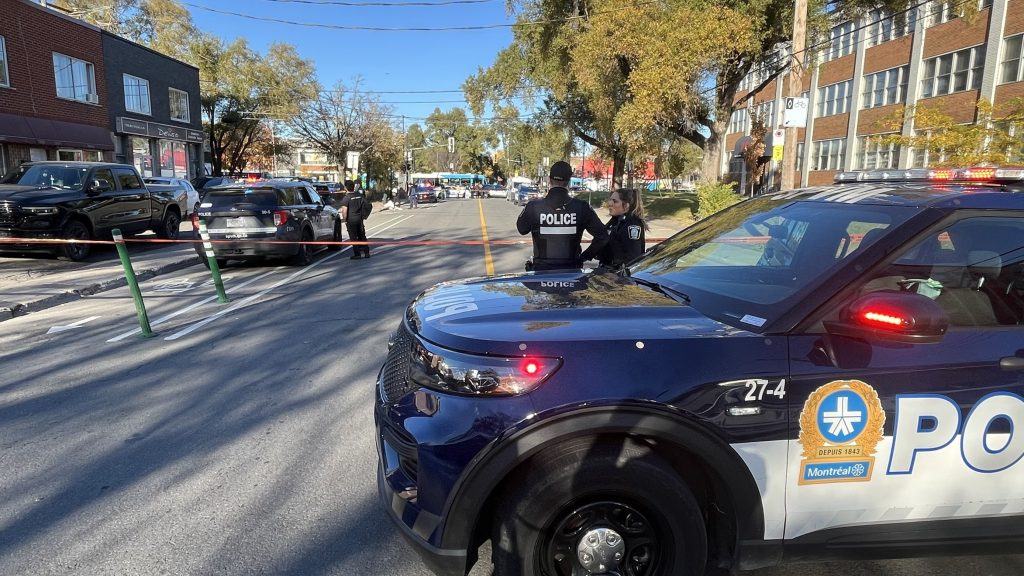Police directors’ group hoping to prepare mental health program for all Quebec police officers

Posted November 4, 2024 5:54 pm.
Last Updated November 4, 2024 6:04 pm.
Editor’s note: This article contains graphic details some readers may find disturbing.
The nature of police work inevitably affects officers’ mental health. To support them in their psychological well-being, the Association of Police Directors of Quebec (ADPQ) is working to establish a mental health program for all police officers in the province.
Some police services already have this type of program, but not all municipalities benefit from it.
The association plans to present program options to the Ministry of Public Security in a few months and is seeking financial support from the government to carry out this project. “The ADPQ is convinced that this type of program is essential,” said Pierre Brochet, president of the ADPQ, on Monday at a press conference at the Longueuil police (SPAL) department.
“The Association is aware that many police services do not have the resources to provide regular access to specialist psychologists,” added Brochet, who is also police director in Laval. “This is why the ADPQ had the idea of creating a Quebec police assistance program. Today we are not announcing this program. We confirm that the ADPQ is working together with the Sûreté du Québec to see what type of program could see the light of day and the costs that would be associated with it.”
Montreal police (SPVM) is one of the services that has established its own mental health support program for its officers. The SPVM program is mainly funded by the City of Montreal, which is not the case for all municipalities in Quebec.
“They have a very good monitoring system for all mental health issues with dedicated psychologists,” said Brochet, speaking of the SPVM. “We rely heavily on this example in our desire to expand a model that would be similar, but across the province.”
The ADPQ wants the government to allocate a budget for its Quebec program, funding which would probably be done jointly with the municipalities, explained Brochet.
He emphasizes that the Montreal model should be adaptable to all police officers in Quebec depending on their reality. There are also challenges in recruiting and retaining psychologists in the context of a labour shortage.
Officers exposed to traumatic events
In Quebec, psychological injuries are 5.2 times higher among police officers than for other professions. This is mainly due to the potentially traumatic events to which police officers are exposed on a daily basis, explained Annie Gendron, researcher at the Centre for Strategic Research and Development at the National Police Academy of Quebec.
Gendron adsds that more than 75 per cent of police officers report having been exposed to such events at least once in their career.
Officer Pierre-Charles Lussier, from the Roussillon Police Department, spoke about his experience during the press conference.
He recounted the death of his best friend, five years ago, who took his own life. His superior officer stopped him from entering the house, but the image of his dead friend on a stretcher still torments him.
Lussier also mentioned other events which still disturb him today, in particular a young person who threw himself from a viaduct and whose body was hit by a car.
“I remember the horrible scene. … These are symptoms that come back to me every time I see an overpass when I’m on the road,” testified Lussier, who was diagnosed with post-traumatic stress syndrome.
In the first year of his career, Lussier witnessed 17 deaths, including road accidents, voluntary actions and deaths from natural causes.
“These are smells, images, strong emotions that come back and haunt us, not to mention the nightmares. … We are not robots or superheroes, we are humans like everyone else,” said Lussier, who has been a police officer for 10 years.
Brochet said that Roussillon is “a fairly quiet corner,” a residential part of the South Shore of Montreal. He emphasizes that this demonstrates that it is not because an officer works in a smaller police force that he will necessarily be less exposed to potentially traumatic events.
“Everyone will experience traumatic events, it’s part of the nature of the job. We can’t miss it. When there are crimes or serious events, we call 9-1-1 and the police are the first to arrive. It won’t change. So we need to see how we can develop resilience in our police officers and prepare them for that,” he maintained.
Monday’s press conference aimed to continue the deployment of a campaign to promote the profession of police, the theme of which this year is the mental health of police officers. A video intended for the general public was broadcast to raise awareness of this issue.
–This report by La Presse Canadienne was translated by CityNews.
Need help?
If you are thinking about suicide or are worried about a loved one, there are people available to help you, anywhere in Quebec, at any time.
Phone: 1-866-APPELLE (1-866-277-3553)
Text: 535 353
Chat, information and tools: www.suicide.ca








